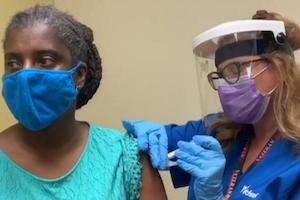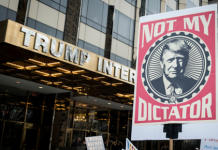
As the U.S. exceeded 300,000 deaths from the coronavirus and more than 16 million confirmed cases of the disease, health workers across the U.S. received the first doses of the COVID-19 vaccine made by Pfizer and BioNTech. Another pharmaceutical company, Moderna, will likely receive Food and Drug Administration authorization for the emergency use of its vaccine within a week. A detailed review of both vaccines by the FDA confirmed the two-shot regimen was “highly effective” in a clinical trial and carried no serious safety concerns.
Because the supply of COVID-19 vaccines in the U.S. is limited, initial supplies will be allocated to healthcare workers and vulnerable resident and staff in long-term care facilities, which have suffered an estimated 40 percent of coronavirus deaths in the U.S. People with chronic conditions and who are over 65 will also be in the front of the line. For average Americans, however, the earliest most people will receive vaccinations will likely be in the spring or over the summer.
Between The Lines’ Scott Harris spoke with Michelle Mahon, a registered nurse and the National Nurses United union’s assistant director of nursing practice. Here, she discusses the major challenge ahead for the equitable distribution of coronavirus vaccine to vulnerable populations, and communities that are skeptical of vaccines and have been underserved by the nation’s for-profit healthcare system.
MICHELLE MAHON: In the United States, the impact of illness and death has disproportionately impacted people of color. It has disproportionately impacted nurses of color. We’ve got just 4 percent of the registered nurses in the United States are Filipinx. Yet, they comprise almost 60 percent of the deaths. So, this disproportionate impact has always been present within our healthcare system. And it has really shown itself in very bad ways throughout the pandemic. And when we look at addressing inequality and healthcare disparities and the impact, we can see areas that have greater need than others.
And so it’s very important that when we evaluate how we deploy it in combination with information we have about the way that the virus has already impacted certain communities, it’s very important that we are considering distribution, not just by title, for example, nurses or doctors, but by exposure risk. There are many who are exposed for example, who support the care in the hospital and provide very important work such as environmental services, dietary and in high-risk areas. So one of the challenges that we see with the allocation is that in the plan that what we’re calling the health care workers and the long-term care high-risk folks in the group of what we call 1A, which is the first group, we already know that even within that group, only a very small percentage of people will actually have access to inoculation. And then on top of that, the various states have been left to make decisions beyond this broad category. And so, even at various health department levels, we have seen examples where those priorities of the hospital, who then gets to make the determination of how to allocate those doses, may align with the priorities and they may not. And so there’s a lot of ambiguity. But again, even with this initial percentage of people who will have access to inoculation — even within the high priority group — is very small. And so we cannot allow ourselves to feel like we can just stop all these other measures. Now, even with a vaccine, all of these people need protection.
SCOTT HARRIS: Michelle, what in your view, should our government – be it federal, state and local – be doing right now to ensure the fair and equitable distribution of these vaccines and certainly address the vulnerable populations we’ve been talking about, as well as people in various communities who are very skeptical and fearful of taking these medications?
MICHELLE MAHON: As we’ve learned time and time again, throughout this pandemic is that the corporations are not going to willingly put their profits aside. We’ve seen that with hospital corporations throughout the United States, PPE manufacturers, etc. But, most importantly, I think what needs to happen right now is that we need to engage in a conversation about putting the people’s priorities first. And that means supporting people, not just in the vaccine initiative, but in all of the initiatives that we need to truly address and go to the heart of the structural problems and failures of our United States healthcare system. And that means having open and honest conversations about the vaccine, being very clear — “This is what we know, what we don’t know, what we hope to learn” and making the space for people to ask questions. But it also means being really honest and tough about the misplaced priorities our U.S. healthcare system and to frankly address those on a more permanent basis.
Nurses, implore people to “please stay home, avoid social gatherings. Please wear a face mask when you leave your home so that we can get through the next few weeks so that we can maximize the hope that comes with a future where we have effective preventative measures, such as a vaccine.”
And really, we are calling on everybody to call upon Congress to demand that the stimulus package for the people be implemented as well as would include the protections that we need to continue to work and keep you safe.
For more information, visit the National Nurses United Union at NationalNursesUnited.




